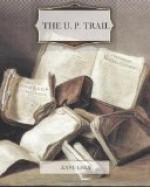Slingerland hated the railroad, and he could not see as Neale did, or any of the engineers or builders. This old trapper had the vision of the Indian—that far-seeing eye cleared by distance and silence, and the force of the great, lonely hills. Progress was great, but nature undespoiled was greater. If a race could not breed all stronger men, through its great movements, it might better not breed any, for the bad over-multiplied the good, and so their needs magnified into greed. Slingerland saw many shining bands of steel across the plains and mountains, many stations and hamlets and cities, a growing and marvelous prosperity from timber, mines, farms, and in the distant end—a gutted West.
He made his first camp on a stream watering a valley twenty miles from the railroad. There were Indian tracks on the trails. But he had nothing to fear from Indians. That night, though all was starry and silent around him as he lay, he still held the insupportable feeling.
Next day he penetrated deeper into the foothills, and soon he had gained the fastnesses of the mountains. No longer did he meet trails except those of deer and wildcat and bear. And so day after day he drove his burros, climbing and descending the rocky ways, until he had penetrated to the very heart of the great wild range.
In all his roaming over untrodden lands he had never come into such a wild place. No foot, not—even an Indian’s, had ever desecrated this green valley with its clear, singing stream, its herds of tame deer, its curious beaver, its pine-covered slopes, its looming, gray, protective peaks. And at last he was satisfied to halt there— to build his cabin and his corral.
Discontent and longing, and then hate, passed into oblivion. These useless passions could not long survive in such an environment. By and by the old trapper’s only link with the past was memory of a stalwart youth, and of a girl with violet eyes, and of their sad and wonderful romance, in which he had played a happy part.
The rosy dawn, the days of sun and cloud, the still, windy nights, the solemn stars, the moon-blanched valley with its grazing herds, the beautiful wild mourn of the hunting wolf and the whistle of the stag, and always and ever the murmur of the stream—in these, and in the solitude and loneliness of their haunts, he found his goal, his serenity, the truth and best of remaining life for him.
37
A band of Sioux warriors rode out upon a promontory of the hills, high above the great expanse of plain. Long, lean arms were raised and pointed.
A chief dismounted and strode to the front of his band. His war-bonnet trailed behind him; there were unhealed scars upon his bronze body; his face was old, full of fine, wavy lines, stern, craggy, and inscrutable; his eyes were dark, arrowy lightnings.
They beheld, far out and down upon the plain, a long, low, moving object leaving a trail of smoke. It was a train on the railroad. It came from the east and crept toward the west. The chief watched it, and so did his warriors. No word was spoken, no sign made, no face changed.




